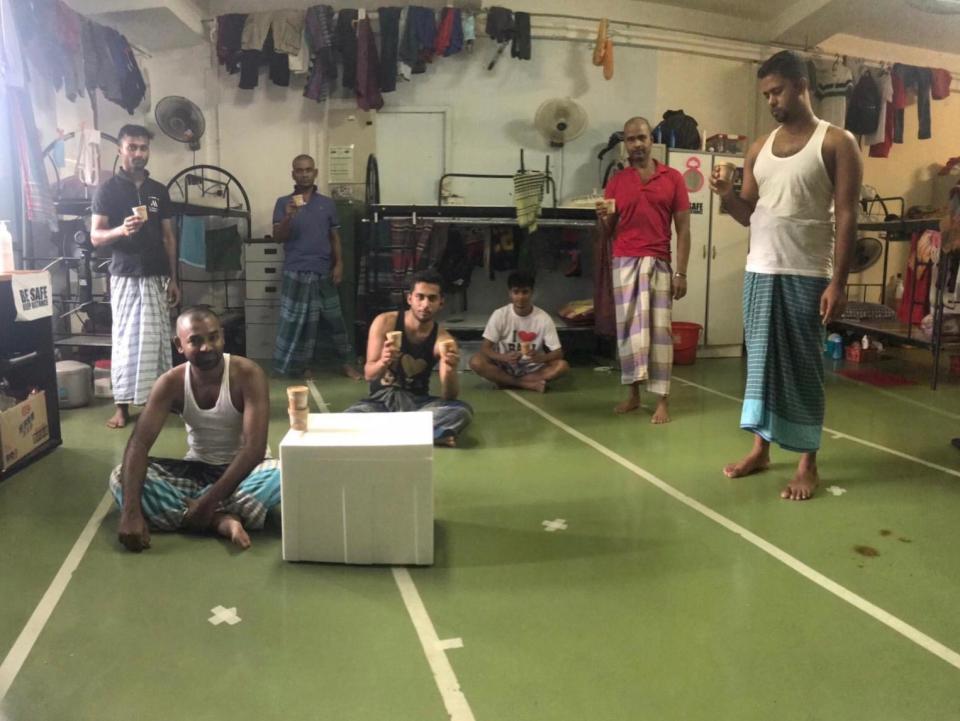COVID-19: Happy faces, full bellies of migrant workers drive volunteers on

SINGAPORE — He went four days without food and would have continued to starve if a volunteer group had not stepped in.
The migrant worker had approached Itsrainingraincoats (IRR), which assist migrant workers, for help between end-March and early April after being confined to his shophouse residence without assistance. Though he had heard the group could help him, he was reluctant to provide his details.
“We had casual conversations at first... then we started sending him meals. Now, he’s doing very well and he’s still in touch with me and appreciative of the meals that we have sent him. If we didn’t know of his condition and left it as it is, we wouldn’t know what this person might end up doing,” volunteer Harsharan Kaur Basant, 25, said.
Yahoo News Singapore spoke to Harsharan and two other IRR volunteers to get a glimpse into the intricate on-ground network the group has pulled together to help foreign workers.
Harsharan, who owns online business Basant Fashion House, is one of a growing pool of volunteers joining non-governmental groups and chipping in to help amid the spike in COVID-19 cases among migrant workers here.
Another volunteer is freelance writer Mudrika Sharma, who signed up as she saw how her effort was going to make a difference. “The workers are really going through a lot at this time. It is so different for us, we’ve got comfortable homes. We cannot (readily) comprehend what they are going through. Being so far from their families, it’s a big challenge for them at the moment,” the 42-year-old mother said.
Project manager Annice Tan agreed, “It’s sad when all these migrant workers, having put in so much for Singapore, go hungry. They deserve our genuine care and concern.”
Migrant workers in need
As of Wednesday (13 May), Singapore has recorded over 25,000 cases of COVID-19, with more than 23,000 of those being work permit holders living in dormitories.
More than 50 clusters have been linked to foreign worker dormitories, with Singapore’s largest cluster linked to S11 Dormitory@Punggol, followed by Sungei Tengah Lodge and Tuas View Dormitory. These three are among 25 dorms that have been gazetted as isolation areas.
The spike in dormitory cases prompted the government to isolate workers living there in a bid to curb the spread of the virus. Workers are banned from moving in and out of dormitories but have meals catered for them. Some 400,000 foreign workers are currently under stay orders.
The government has also pledged to improve workers’ living conditions – many live in cramped, and sometimes unhygienic, quarters.

Itsrainingraincoats started out in 2015 as an initiative to spread kindness to migrant workers and create awareness of the issues they face. Its work has since evolved – the group now works to improve the lives of migrant workers through providing meals, financial aid, and prepaid cards, among other efforts. Since February, some 200 volunteers have also signed up, bringing IRR’s volunteer numbers to around 500.
The trio of volunteers, who first began volunteering as the foreign worker dormitories emerged as COVID-19 clusters, assist with co-ordination efforts. They help provide the workers the support they need, whether it is food or entertainment options.
While they had been aware of IRR and its work, they joined recently as they felt they could contribute with their skills and experience in logistics, public relations and past volunteering stints.
First line of help
As a first line of help, Harsharan receives calls or text messages directly from migrant workers in need of help, be it food, masks, a top-up of their SIM cards or other necessities. Harsharan, who is also working part-time as an administrator, will then log a ticket in IRR’s system and follow up on the cases.
Tan, 32, acts as a middleman between donors and migrant workers, receiving and consolidating donations which are then sent to the workers in two or three batches a day.
Tan, who began volunteering about a month ago, said that she received such an overwhelming response that her balcony and a corner of her flat’s corridor have been filled with donations, ranging from board games to coffee, and even a ukulele. Potential donors call her to ask the quantity and variety of items they can donate, and Tan would go through the list with them before donors deliver the items to her residence or directly to the dormitories.

“Some of them see the same news as what we see, the number of cases, how it spreads... but there are some who feel lost; they are scared,” said Tan.
“For us, we have access to masks and hands sanitisers. For them, they’re on lockdown, they can’t get anything by themselves. So, that’s how we can help. Apart from the meals they get, there is a need for some snacks and coffee to cheer them up. They can get cabin fever, being in the same room or not allowed to leave their dorms,” she added.
Mudrika has even built her own ready pool of donors whom she can tap on for help.
She follows-up on potential donors by answering their queries, and checks on workers who lodge tickets for help. Just before speaking to Yahoo News Singapore, she received a call from a worker who asked for groceries for Ramadan.
Public servant Nicholas Yeo said that IRR connected him to a migrant worker, to whom he has since donated $250 over two occasions in April. He also speaks to the worker regularly to see how he is doing.
“During that week, there was suddenly a lot of limitations. Some of my friends were trying to come up with something (to help the workers). Then, we couldn't go to the dorms, couldn't meet people, couldn’t go out and meet strangers, it became very tough. We soon realised that the best way is to do it digitally, through cash donations, speaking to people over text or on the phone,” said the 33-year-old.
Workers fear retaliation
But simple tasks such as liaising with the workers come with its challenges and emotional moments.
The workers’ fear was one of the predominant challenges the volunteers had to deal with.
Said Mudrika, “They are very afraid... some would say we haven’t got our salaries for three months. I ask why. I ask them, ‘would you like to report to MOM (Ministry of Manpower)’, they say ‘no, no, I might lose the job’. They are very scared of losing their jobs.”
Harsharan told Yahoo News Singapore that some workers approached them for assistance but later backed off.
“(The employers) tell them ‘I’m going to cancel your work permit because you asked for help’,” she said.
“Workers, especially those who are new here, will get scared as they spend so much money in their hometown trying to get permits and paperwork done. They are here now but are facing all these challenges due to the circuit breaker.”

Mudrika recalled a woman who sought help from her after her father passed away in Malaysia while the movement control order, which closed the country’s borders, was in force. She then called the Malaysian border authorities to facilitate the woman’s return to Johor Bahru.
“It seemed impossible that she could be there for the funeral and to see her father for the last time,” she said. The woman was able to make it home as she did not have COVID-19 symptoms upon reaching the border.
For Harsharan, the fact that some workers went without meals hit her hard.
“I remember several times when I was eating dinner, and they messaged me, ‘we don't have food’ or ‘we’ve run out of groceries’, and I'm there eating, with the spoon in my mouth,” she said.
Workers’ gratitude a motivational force
The volunteers chip in whenever they’re free, easily spending four to six hours a day liaising or packing.
“The best part is when they get (the supplies) and can’t stop thanking you,” said Harsharan, who added that she has become closer friends with a few of the workers.

One such worker who received aid is Rahman Shahinur, 30. He contacted IRR for food and was given funds to buy fish and vegetables.
The Bangladeshi texted, “I (am) very proud and smiling and thank you to Allah and IRR. Always, I have need, sometimes IRR try his best... help me.”
The workers’ happiness is a driving force for Tan, who said, “I love seeing photos of all the workers at the end of the day, all their happy faces and having their bellies filled.”
Fellow volunteer Mudrika agreed, “Every day is a very satisfying day when you’re able to help. The moment the message of help comes to you, it becomes personal.”
Stay in the know on-the-go: Join Yahoo Singapore's Telegram channel at http://t.me/YahooSingapore
Related stories
COVID-19: Four more foreign worker dorms declared isolated areas; total at 25
COVID-19: Singapore crosses 14,000 mark with 799 new cases, majority foreign workers in dorms
COVID-19: Stern warning for dorm which locked foreign workers in a room – reports
COVID-19: Decision not to take tighter measures in dorms earlier not about cost – Josephine Teo



